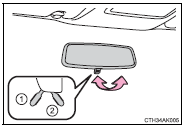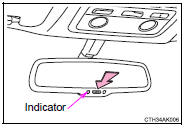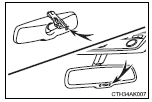Toyota Corolla (E170) 2014–2019 Owners Manual / Operation of each component / Adjusting the seats / Inside rear view mirror / Anti-glare function
Toyota Corolla (E170): Anti-glare function
► Manual anti-glare inside rear view mirror
Reflected light from the headlights of vehicles behind can be reduced by operating the lever.
1 Normal position
2 Anti-glare position

► Auto anti-glare inside rear view mirror
Responding to the level of brightness of the headlights of vehicles behind, the reflected light is automatically reduced.
Changing automatic anti-glare function mode
On/off
When the automatic anti-glare function is in ON mode, the indicator illuminates.
Vehicles without a smart key system: The function will set to ON mode each time the engine switch is turned to the “ON” position.
Pressing the button turns the function to OFF mode. (The indicator also turns off.) Vehicles with a smart key system: The function will set to ON mode each time the engine switch is turned to IGNITION ON mode.
Pressing the button turns the function to OFF mode. (The indicator also turns off.)

■To prevent sensor error (vehicles with an auto anti-glare inside rear view mirror)
To ensure that the sensors operate properly, do not touch or cover them.

CAUTION
Do not adjust the position of the mirror while driving.
Doing so may lead to mishandling of the vehicle and cause an accident, resulting in death or serious injury.
Other materials:
Tire information
Typical tire symbols
► Full-size tire
► Compact spare tire
1 Tire size
2 DOT and Tire Identification Number (TIN)
3 Uniform tire quality grading
For details, see “Uniform Tire Quality Grading” that follows.
4 Location of treadwear indicators
5 Tire ply composition and ma ...
Circuit description
In the diagram below, when the engine is cranked, current flows from terminal
st2 of the ignition switch to
the starter relay coil and also current flows to terminal sta of the ecm (sta
signal).
When the sta signal and ne signal are input to the ecm, tr is turned on, current
flows to the c ...
Inspection procedure
1 Check side squib(rh) circuit(airbag sensor assy center – front
seat airbag assy rh)
Disconnect the negative (–) terminal cable from the battery,
and wait at least for 90 seconds.
disconnect the connectors between the airbag sensor
assy center and the front seat airbag assy ...


